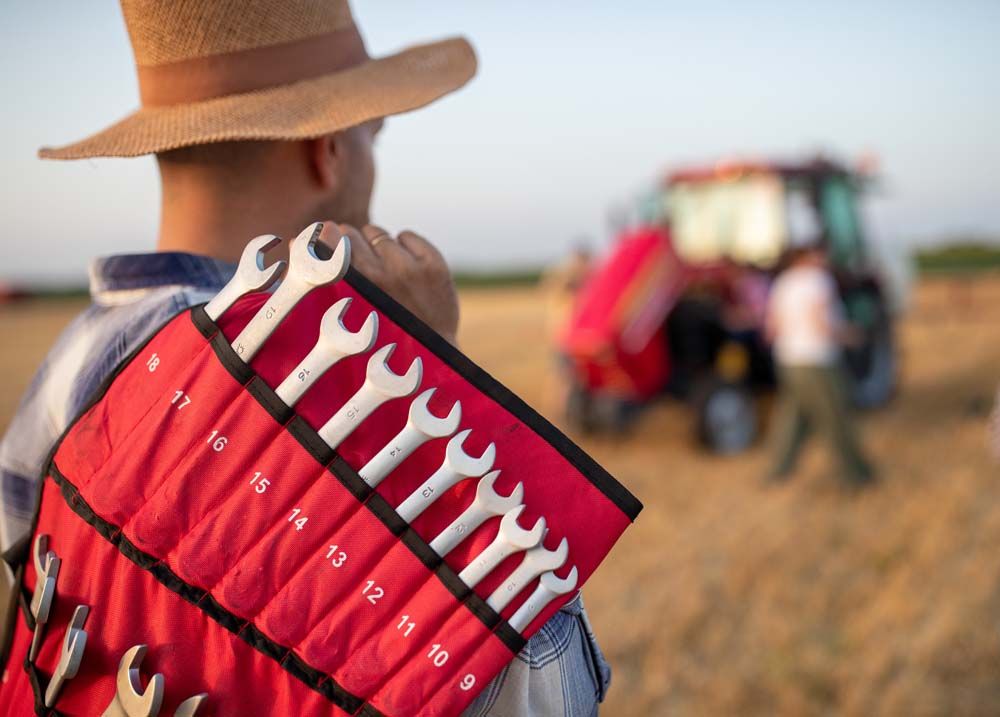Can I Farmer-Fix It?


Right-to-repair has been a hot topic in agriculture for a few years and it continues to be important. When a piece of machinery breaks down, it is crucial to get it repaired as quickly as possible. As technology continues to develop, many farmers no longer have access to the information and tools needed to repair their equipment themselves. This shows why right-to-repair is so important. Here are your right-to-repair questions, answered.
What is right-to-repair?
Right-to-repair is the concept that farmers should have a right-to-repair their own equipment by having access to the information and tools needed to do that.
As farm equipment gets more complicated and has more complicated software, farmers have lost the ability to repair their equipment themselves. Equipment breakdowns can cause huge and costly disruptions on farms, especially if the nearest dealer that could repair equipment is hundreds of miles away, as is the case for some farmers. Relying on authorized dealers for repairs can cost farmers valuable time and money. Right-to-repair doesn't just allow farmers to fix their equipment, it also allows independent service technicians the opportunity to operate.
Where is right-to-repair at right now?
Instead of relying on a policy solution, the American Farm Bureau Federation (AFBF) worked to find a private-sector solution to right-to-repair issues. AFBF has entered into memorandum of understanding (MOU) agreements with some major equipment manufacturers. These MOUs give farmers access to error codes, specialty tools, and information on how to make necessary repairs.
The MOUs also allow farmers and independent service technicians to purchase diagnostic tools that help diagnose and solve problems from the manufacturers at a reasonable price. These MOUs do not allow for the modification of machinery, just repairs.
The MOUs also protect the company’s intellectual property rights. Currently, AGCO, CLAAS of America, CNH Industrial (which includes Case IH and New Holland), John Deere, and Kubota have entered into these MOUs with Farm Bureau. This means that approximately three fourths of agricultural machinery sold in the United States is covered under one of these right-to-repair MOUs.
MOUs serve as a great solution to right-to-repair issues because it means that as changes happen and new technology is developed, Farm Bureau and these companies can review the MOUs. This means that the MOUs can be changed and updated as needed. These changes can be made much faster in an MOU than it could if right-to-repair was addressed through federal policy.
Is a policy solution necessary?
An MOU is a simply a memorandum of understanding, which means that in the event that Farm Bureau and an equipment manufacturer have a disagreement, there is nothing stopping one of them from leaving the MOU. A federal policy would work to hold companies accountable in the event that they decide to leave the MOU.
A policy solution would be a more permanent solution, but as previously mentioned, it would be a lot harder to change and modify the policy as needed. MOUs offer more flexibility and the opportunity to review what is happening far more often. Unfortunately there is no clear or easy solution to whether a policy solution or an MOU would be better.
Do policy solutions work?
In 2023 legislative sessions, four states passed legislation about right-to-repair. Many other states considered legislation on agricultural right-to-repair, but Colorado was the only one to enact policy that addresses agricultural right-to-repair.
Colorado’s Consumer’s Right-to-repair Agricultural Equipment Act covers basically the same items that American Farm Bureau’s MOUs do. This policy means that equipment manufacturers must provide parts, software, firmware, tools, and other information to farmers and independent repair providers. This legislation officially went into effect on January 1, 2024.
Since this legislation aligns closely with the MOUs, there are no issues, but if other states begin to pass right-to-repair legislation each with changed language, manufacturers could have issues honoring the MOUs at the same time as state legislation.
At the federal level, the Agricultural Right-To-Repair Act was introduced in the Senate in 2022, but didn’t make it any farther. More recently, a separate Agricultural Right-To-Repair Act was introduced in the House of Representatives in September 2023, but the act hasn’t made it any farther than its committee so far.
What are the right tools?
Right-to-repair is a complicated issue that has made huge progress over the last few years. By allowing farmers and independent repair providers the right-to-repair equipment, farmers will save valuable time and money.
At the moment, MOU agreements in place with many major equipment manufacturers are giving farmers access to the tools and information that they need.
Some people still think that a policy solution would be a better and more permanent solution. States are passing legislation about agricultural right-to-repair and federal policies are being introduced. Even though there is a right-to-repair solution at the moment, we will see the conversation surrounding this issue continue. We also might see changes in the future.
Tags:The Farm Babe

Acreage Life is part of the Catalyst Communications Network publication family.











